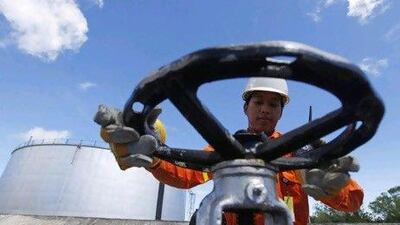• More on the Middle East unrest
RIYADH // Oil and gold prices jumped on global markets yesterday as violence in Libya escalated amid a wave of unrest across the Middle East.
Libyan security forces have reportedly killed more than 200 protesters since rioting started last week.
Saif al Islam Qaddafi, the second-eldest son of Muammar Qaddafi, the Libyan leader, warned that crude exports would be halted if protesters had their way. Several oil companies, including Royal Dutch Shell, BP, RWE, and Statoil withdrew personnel from Libya and suspended drilling operations in the country.
Brent crude oil futures for April delivery climbed as much as US$2.56 to $105.08 a barrel, the highest since September 25, 2008, on London's ICE Futures Europe exchange. Gold rallied for a sixth day, surpassing $1,400 an ounce.
Anti-government demonstrators in the Libyan capital, Tripoli, stormed public buildings including the state television building, setting it on fire, according to Agence France-Presse. Protesters were already in control of the eastern city of Benghazi, several demonstrators said.
Saif al Islam Qaddafi, who appeared on state TV on Sunday night, said the country was in danger of splitting apart and descending into civil war.
"Oil will stop. Foreign companies will leave Libya tomorrow," he said. "This oil will be burnt. Thugs, criminals, gangs and tribes will burn it."
Workers at one Libyan oilfield, Al Nafoora, went on strike in protest against the government, Al Jazeera TV reported. Shares of Eni, the biggest foreign oil producer in the country, and OMV, another oil producer, dropped.
Shokri Ghanem, the chairman of Libya's National Oil Corporation, said he had no information about a disruption of crude production.
Libya, a member of Opec, produces 1.7 million barrels of oil per day (bpd), most of it exported to Europe. Since the popular overthrow of governments in Tunisia and Egypt, several Middle East oil exporters, including Yemen, Bahrain and Kuwait, have experienced social unrest. The Mena region accounts for about a third of world oil production.
The International Energy Agency (IEA), which represents the interests of 28 energy-importing nations, said there was enough crude oil in storage in member countries to provide 4 million bpd to the market for a year.
"Our organisation is on fairly high alert, as it always is," said David Fyfe, the head of the IEA's oil industry and markets unit.
Opec maintains about 6 million bpd of spare oil production capacity, mostly in Saudi Arabia, and has a long-standing commitment to meet global demand in the event of a supply disruption.
Opec oil ministers are due to hold long-planned talks with officials from consuming countries in Riyadh today, but so far the 12-member group has remained silent on the risks to oil supply.
On a tour of a large oilfield in Saudi Arabia yesterday, Yousef al Furaidan, a production manager at Saudi Aramco, said: "Anything we can produce to the world market we will not hesitate to produce it … We are very confident we can keep the market balanced with our rate."
Saudi Arabia pumps 8.4 million bpd and has about 4 million bpd of spare production capacity.
The UAE has about 500,000 bpd of spare production capacity.
* with agencies

